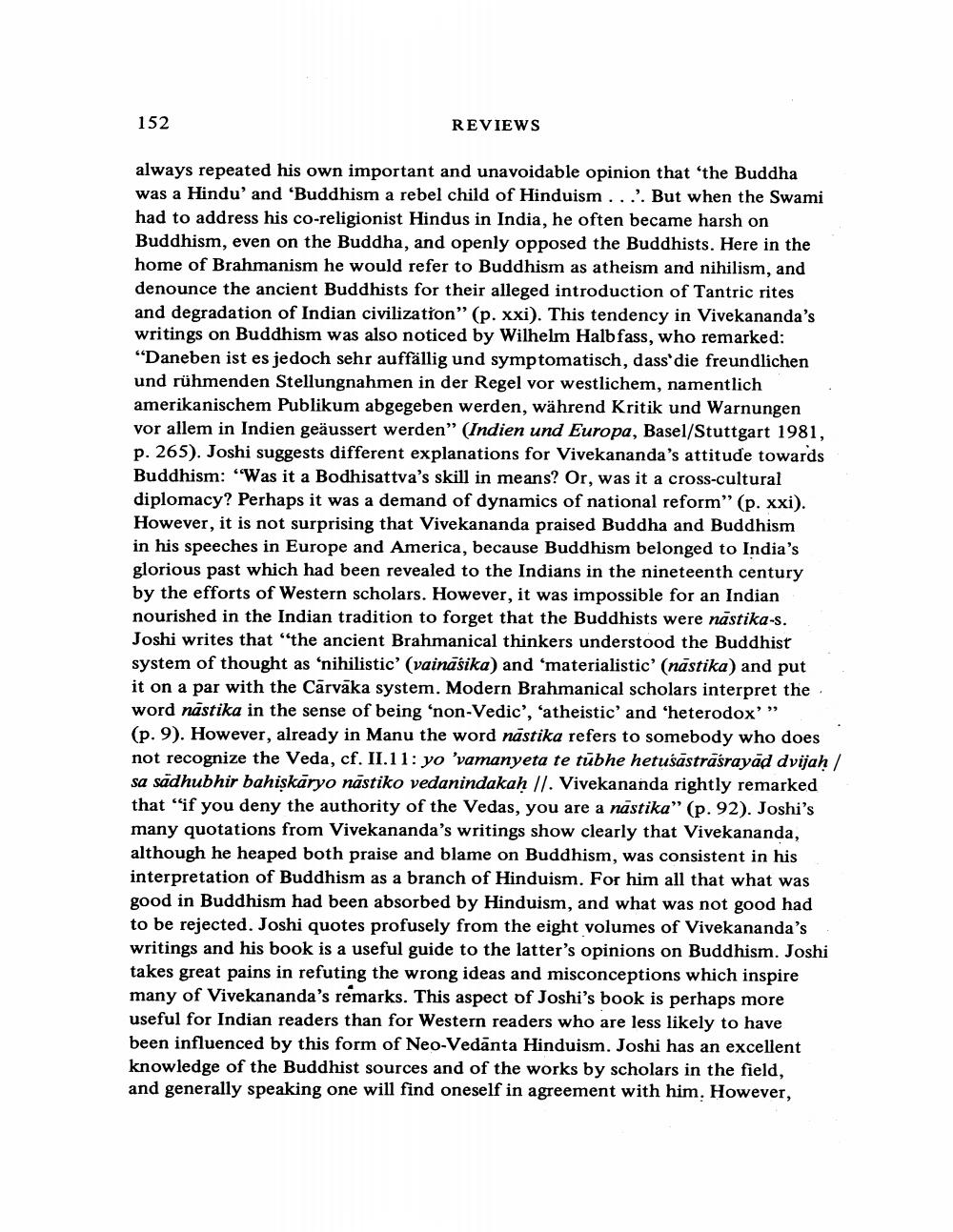Book Title: Reviews Of Diffeent Books Author(s): Publisher: View full book textPage 6
________________ 152 REVIEWS always repeated his own important and unavoidable opinion that 'the Buddha was a Hindu' and 'Buddhism a rebel child of Hinduism .... But when the Swami had to address his co-religionist Hindus in India, he often became harsh on Buddhism, even on the Buddha, and openly opposed the Buddhists. Here in the home of Brahmanism he would refer to Buddhism as atheism and nihilism, and denounce the ancient Buddhists for their alleged introduction of Tantric rites and degradation of Indian civilization" (p. xxi). This tendency in Vivekananda's writings on Buddhism was also noticed by Wilhelm Halbfass, who remarked: "Daneben ist es jedoch sehr auffallig und symptomatisch, dass die freundlichen und ruhmenden Stellungnahmen in der Regel vor westlichem, namentlich amerikanischem Publikum abgegeben werden, wahrend Kritik und Warnungen vor allem in Indien geaussert werden" (Indien und Europa, Basel/Stuttgart 1981, p. 265). Joshi suggests different explanations for Vivekananda's attitude towards Buddhism: "Was it a Bodhisattva's skill in means? Or, was it a cross-cultural diplomacy? Perhaps it was a demand of dynamics of national reform" (p. xxi). However, it is not surprising that Vivekananda praised Buddha and Buddhism in his speeches in Europe and America, because Buddhism belonged to India's glorious past which had been revealed to the Indians in the nineteenth century by the efforts of Western scholars. However, it was impossible for an Indian nourished in the Indian tradition to forget that the Buddhists were nastika-s. Joshi writes that "the ancient Brahmanical thinkers understood the Buddhist system of thought as 'nihilistic' (vainasika) and 'materialistic' (nastika) and put it on a par with the Carvaka system. Modern Brahmanical scholars interpret the word nastika in the sense of being 'non-Vedic', 'atheistic' and 'heterodox"" (p. 9). However, already in Manu the word nastika refers to somebody who does not recognize the Veda, cf. II.11: yo 'vamanyeta te tubhe hetusastrasrayad dvijah / sa sadhubhir bahiskaryo nastiko vedanindakah //. Vivekananda rightly remarked that "if you deny the authority of the Vedas, you are a nastika" (p. 92). Joshi's many quotations from Vivekananda's writings show clearly that Vivekananda, although he heaped both praise and blame on Buddhism, was consistent in his interpretation of Buddhism as a branch of Hinduism. For him all that what was good in Buddhism had been absorbed by Hinduism, and what was not good had to be rejected. Joshi quotes profusely from the eight volumes of Vivekananda's. writings and his book is a useful guide to the latter's opinions on Buddhism. Joshi takes great pains in refuting the wrong ideas and misconceptions which inspire many of Vivekananda's remarks. This aspect of Joshi's book is perhaps more useful for Indian readers than for Western readers who are less likely to have been influenced by this form of Neo-Vedanta Hinduism. Joshi has an excellent knowledge of the Buddhist sources and of the works by scholars in the field, and generally speaking one will find oneself in agreement with him. However,Page Navigation
1 ... 4 5 6 7 8
